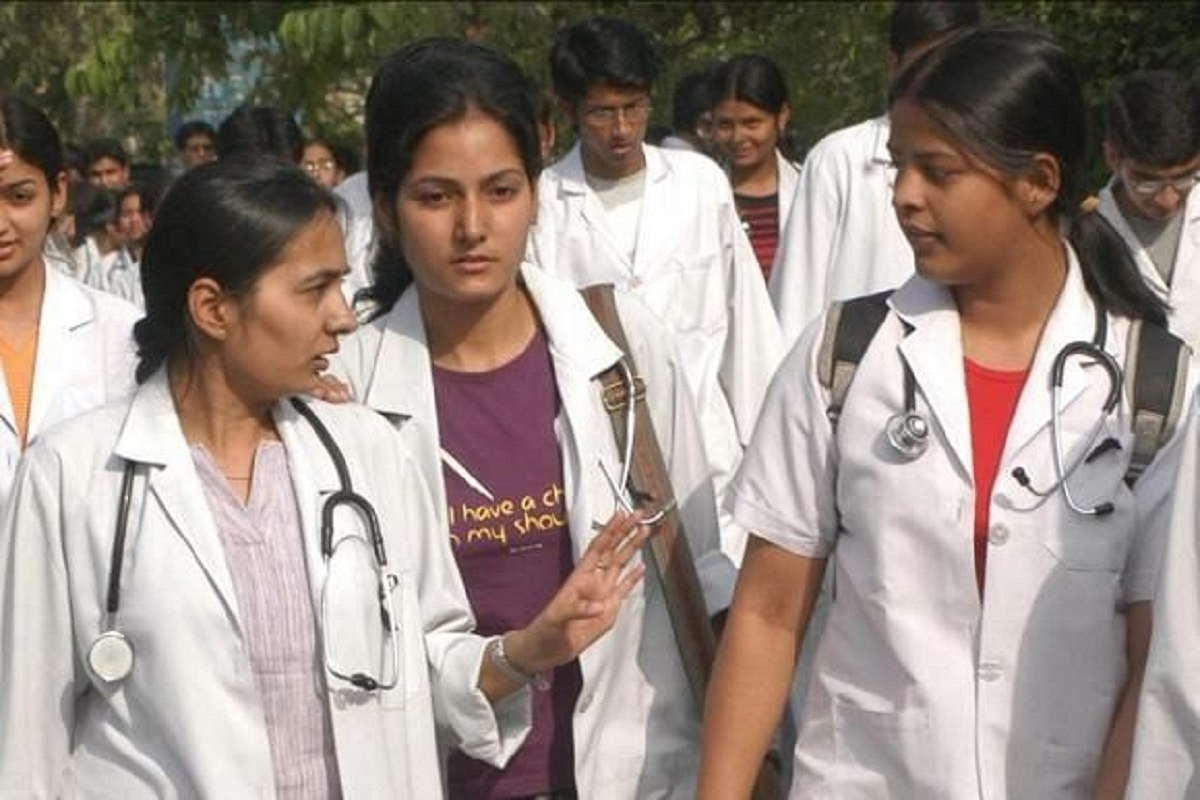Ideas
Will MBBS In Hindi Be As Good As In English? Why Not? Hinglish Is The Future
- There is absolutely no reason why a hybrid of English and Hindi (or any other language) should not be used while imparting knowledge.
- It can never be either/or. The future is Hindi, and English. Or Hinglish.

Medical students. (Vipin Kumar/Mint via Getty Images)
Union Home Minister Amit Shah yesterday (16 October) released the first set of textbooks for an MBBS course in Hindi, making it possible —sometime in the near future — for nearly half the country to become doctors by learning in their mother tongue.
This is in keeping with the New Education Policy (NEP) which emphasises early learning in one’s mother tongue.
In the medium term, this availability of an additional option for MBBS courses will improve the competitive positions of students who are more comfortable in Hindi.
But this does not in any way reduce the need for children and students enrolling for higher degree courses to learn English.
Already there are some naysayers.
The Economic Times quotes Suvrankar Datta, chief adviser to the Federation of All India Medical Association, as saying that the quality of the translation from English to Hindi is below par, “sub-standard”.
The President of the Delhi Medical Association has said that even though students from a non-English background do struggle with English text-books, they still feel empowered. They are judged for their medical knowledge, not grammar competence.
These criticisms should be taken on board, but should not deter medical institutions from slowly offering courses where the language of instruction and text-books are in one’s mother tongue.
After Hindi, it should be the turn of some of the larger Indian languages — Bengali, Tamil, Telugu, Marathi, etc — to offer such courses.
The world over, it is widely acknowledged that children learn best when taught in their mother tongues. It is no stretch of logic to presume the same for higher education, provided a few caveats are added.
One, there is a tendency among language purists to invent new terms in the same language, when the norm should be the use of already established words or terms from English or other languages.
If a term is better understood in English, it should largely be the same in Hindi or Kannada.
For example, everyone understands the word “school” even though the Hindi equivalent in “pathshala”.
In higher education, the need for reinventing words makes even less sense. As long as students understand what a term means, bad pronunciation does not matter.
Over time, English terms can be absorbed into Hindi and other Indian languages.
Two, teaching in the mother tongue need not be exclusively so. There is absolutely no reason why a hybrid of English and Hindi (or any other language) should not be used while imparting knowledge, even while the student has the option of learning from text-books in his mother tongue or English.
Having both is better than having only one option.
A translation in Hindi which is not good enough can easily be supplemented by reading additional reference material in English. And if something is not easily understood in English, the translated version would be helpful.
Three, the texts should be continuously improved, so that the charge that they are sub-standard will evaporate over time.
Initial translations may not be upto the mark, but one wonders whether the first Chinese translations of English and other textbooks hampered the learning of the sciences in that country, which is now a technology superpower. Over time, translations will improve, and this should be the objective.
More than anything else, the pushback against a Hindi course in MBBS represents the viewpoint of a tiny, privileged elite, who would like to retain their competitive edge as long as possible.
Over the years we have made English the enemy of regional languages, including Hindi, and this bias needs to be corrected.
Both for reasons of national self-respect and decolonisation of minds, not to speak of better comprehension, regional languages ought to be the norm for early school teaching, and an additional option for higher education.
It can never be either/or. The future is Hindi, and English. Or Hinglish.
Support Swarajya's 50 Ground Reports Project & Sponsor A Story
Every general election Swarajya does a 50 ground reports project.
Aimed only at serious readers and those who appreciate the nuances of political undercurrents, the project provides a sense of India's electoral landscape. As you know, these reports are produced after considerable investment of travel, time and effort on the ground.
This time too we've kicked off the project in style and have covered over 30 constituencies already. If you're someone who appreciates such work and have enjoyed our coverage please consider sponsoring a ground report for just Rs 2999 to Rs 19,999 - it goes a long way in helping us produce more quality reportage.
You can also back this project by becoming a subscriber for as little as Rs 999 - so do click on this links and choose a plan that suits you and back us.
Click below to contribute.
Latest